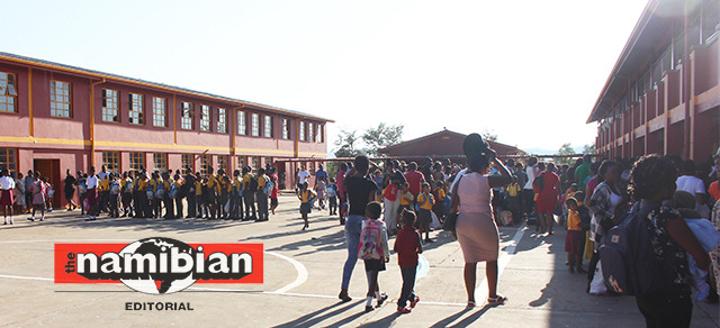Africa-Press – Namibia. GOEDKOOP is duur koop – beware the lure of ‘cheap’ price tags, or so goes the Afrikaans saying.
And one thing Namibians should be wary of is ‘free education’, whereby politicians have instructed managers of state schools not to demand payment from parents.
Sadly, politicians don’t provide caveat emptor, or contractual warnings, when they promise wealth and happiness in their social contract with the voting masses.
The same politicians are nowhere to be seen when children have to carry chairs and other materials to and from school to make their learning a tad more comfortable at state schools.
This week’s matric results likely flatter government leaders – more than 50% of students who wrote the 2021 examinations qualified for a university education.
For the record, that is a commendable feat, and those who played a role in the results should be congratulated.
But politicians need to step back. They deserve none of the credit.
In her statement announcing the 2021 results, education minister Anna Nghipondoka said about 5 000 candidates wrote Advanced Subsidiary level examinations at 88 public and 14 private schools.
Considering the number of secondary schools dotted across Namibia, the 88 schools figure is negligible.
Any celebrations should be tempered because statistics were cherry-picked – perhaps to boost egos.
Spare a thought for the more than 40 000 other pupils who could have been eligible to write school-leaving examinations last year.
However, most schools do not have the resources to offer AS level education.
Schools have had to bear the brunt of inadequate education budgets, affecting the provision of essentials, such as stationery, textbooks and other necessities.
Budget cuts are made while politicians stubbornly enforce a dubious brand of free education – all for the sake of votes so they stay in power.
In the last financial year, the government slashed stationery expenditure for schools by N$17 million. Money for textbooks (perennially in short supply) was cut by N$69 million.
The result is the poor quality of education in state schools.
Namibia’s ‘free education’ is a failure that effectively relieves parents and guardians of their basic responsibility of contributing to the education of their children.
Politicians argue that ‘free education’ has led to higher enrolment, yet official statistics tell a worrying story.
In 2021, Grade 1 enrolment stood at 11% of all children in school, while Grade 12 was a paltry 3%.
It is not far-fetched to then argue that less than 5% of pupils successfully completed the 12 or 13-year school cycle if university entrance or readiness is the benchmark.
Namibians should be very afraid: What has happened to about one million young people who have dropped out of school since independence, some as early as at primary school level?
It’s a time bomb that will explode some day considering that nearly 60% of the population are youth.
It is apparent that ‘free education’ was not well thought through. It seems a careless election ploy for the short-term benefit of the ruling party to the long-term detriment of Namibia – a cheap buy that is damaging in the long run.
Classrooms are overcrowded with one teacher for 45 pupils or more, compounded by a lack of teaching aids.
Free quality education should have been structured as an equaliser responding to the needs of the poor and marginalised who can’t even afford a decent meal.
Access to quality education is now compromised by parents who have the means but choose to put their children in state schools so they can free up funds for luxuries.
That selfish practice by affluent parents and guardians (who often have the best networks to get their children into the best state schools) deprives the needy of a chance to get the best education the government can offer.
The end result is perpetuating poverty, social misery and inequality.
Why provide room for those who can afford to send their children to private schools to elbow out pupils from poorer backgrounds?
It is time politicians abandon this failed concept.
Place the appropriate responsibility back with the parents to ensure children get the best quality of education that can be offered jointly with the state.
As things stand, Namibia’s brand of free education is costly, ruinous and nothing short of self-sabotage.
For More News And Analysis About Namibia Follow Africa-Press






